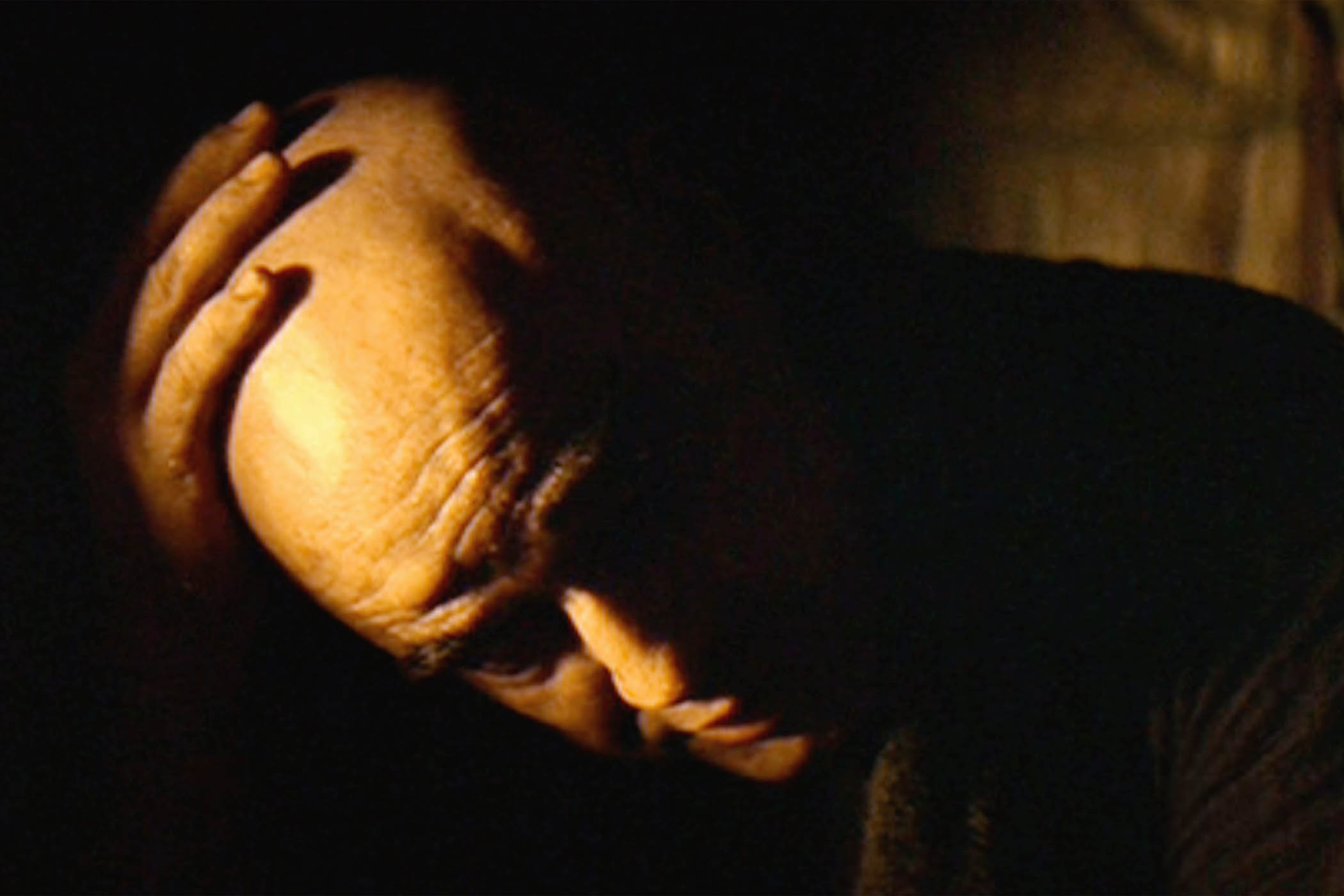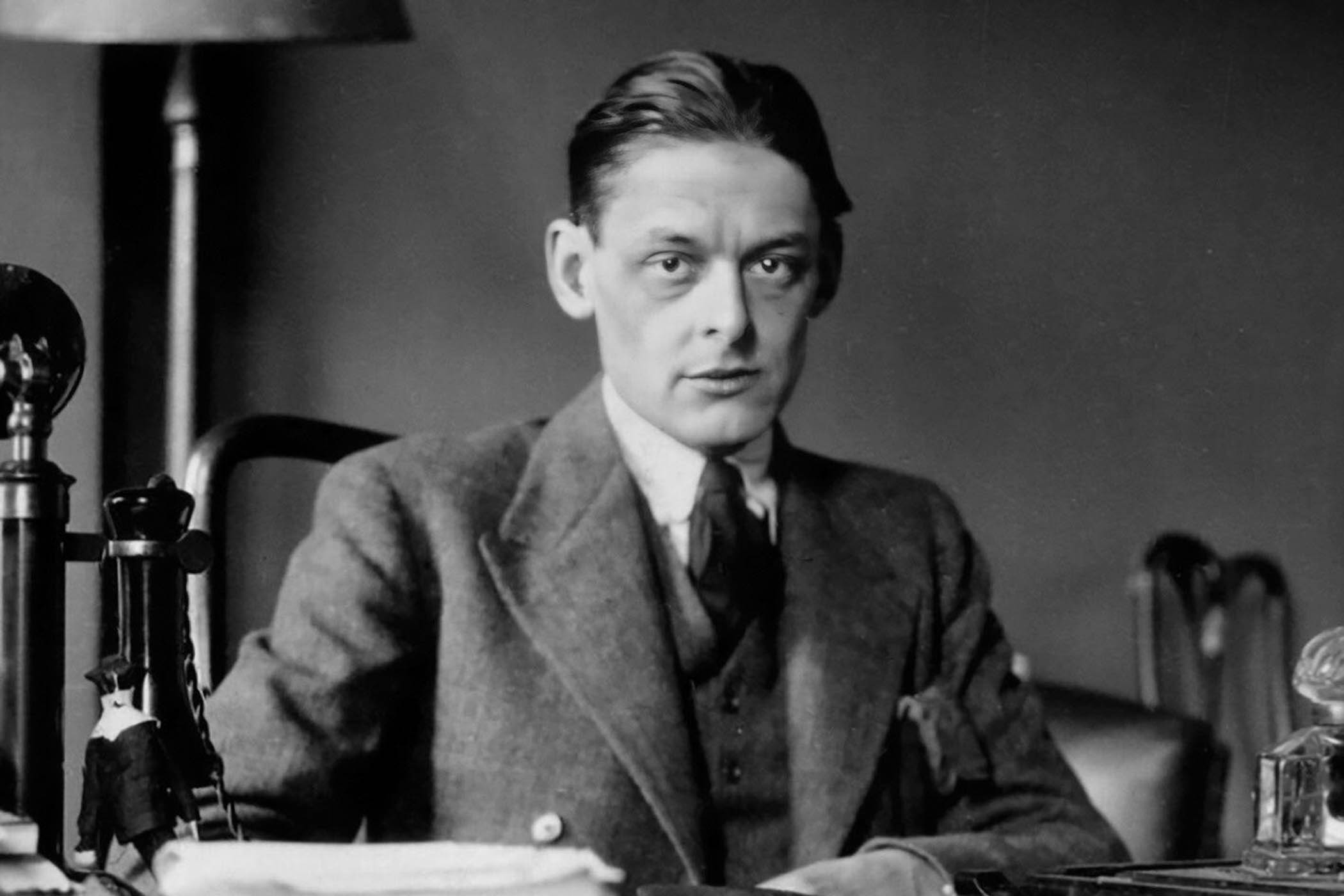Nine years after he published the bleakest poem of his writing career, TS Eliot found out that it had been pilfered. An old student of his at Harvard, Sherman Conrad, heard lines from it, slightly mangled, in the 1934 war romance movie The Fountain.
An hour in, the British character actor Brian Aherne mourns that between his dreams “and the reality … falls the shadow”. “You can no doubt look forward to an old age of cinemas peppered with bits from [other recent poems] Marina and Ash Wednesday,” Conrad quipped in his letter to his old tutor. Eliot seemed unconvinced in his reply two weeks later: “By that time, one might as well be buried.”
A century on, references to The Hollow Men flood pop culture. In the last year, the poem’s title has been used to name mysterious monsters in the sci-fi horror The Gorge, starring Anya Taylor-Joy; an exhibition by the Italian artist Giulia Cenci; and, in singular form, a track by Bruce Springsteen and Bon Jovi. In the last few months, its famous last line (“This is the way the world ends / Not with a bang but a whimper”) has been adapted in news stories about Robert Jenrick, Morgan Stanley’s assessment of the market (“several bangs and one whimper”) and comic riffs in the New Yorker: “This is how the text exchange ends. Not with an explicit farewell but with a two-day pause followed by a thumbs-up-emoji reaction.”
The Hollow Men was Eliot’s first major poem after The Waste Land three years earlier – quite the tough act to follow. It begins like a march (“We are the hollow men / We are the stuffed men / Head full of straw”) before plunging us into a purgatorial landscape, broken images appearing like traumatic flashbacks (“sunlight on a broken column”, “a tree swinging”, “a dead man’s hand”). As its five parts progress, we encounter stars “fading” then “dying”, and human expressions and senses declining in power – “quiet and meaningless” whispers lead to “sightless” people who gather on a beach and “avoid speech”.
Written in the same year as Virginia Woolf’s Mrs Dalloway assessed the horrors of PTSD in the wake of the first world war, the poem’s lines linger for clear reasons, says Eliot’s biographer Lyndall Gordon. “Eliot is catchy. He uses nursery rhymes and chanting rhythms, which we find compelling from childhood, even if the content is barbarous.” The poem’s epigraph contains a phrase about a figure that children build in order to burn (“a penny for the Old Guy”). The refrain of “here we go round the prickly pear” arrives in the last section like a flash of folk horror.
Also powerful is Eliot’s communication of his “extreme state”, Gordon says. “He’s drawing us in, reaching out to us, as he’s trying to pass through death into some kind of new life.” In her 2003 Eliot Memorial Lecture at the Royal Society of Literature, Gordon spoke of the poet looking to the past for redemptive structures, and of his use of a formula from the Bible’s book of Exodus: a “journey through the desert waste towards a promised land”. The Hollow Men tells of people desperate for renewal after a period of deep, arid darkness. In other words, an idea that chimes with our times.
Eliot wasn’t happy with himself or his writing in 1925. Aged 36, still an employee of Lloyds Bank despite the success of The Waste Land, and struggling to keep on top of editing the literary journal he founded, the Criterion, he sent “scraps” of The Hollow Men to the noted American magazine the Dial on 6 January of that year, calling them “drops of blood out of an exhausted stone”.
‘Life is simply from minute to minute of horror,’ he wrote to Virginia Woolf
‘Life is simply from minute to minute of horror,’ he wrote to Virginia Woolf
The poem’s third section had already been published elsewhere, in a miscellany in 1924 (“[it is] bad enough to do the Chapbook no good and to bring me considerable discredit”, Eliot wrote to its editor), while its fifth and final part was completed weeks before its November publication in Poems, 1909-1925. “Can you tell me by return,” Eliot wrote in an incomplete letter to Ezra Pound, his editor of The Waste Land, in early November, “1) Is it too bad to print? 2) If not, can anything be done about it?”
Behind these words was a poet plagued by illness and depression. “I am rather in the doldrums at present … I feel like a shell with no machinery in it,” he wrote to Woolf in February 1925. “Life is simply from minute to minute of horror,” he added to her in March. A meeting with his first love, Emily Hale, a few years earlier, led to him dwelling on the unhappiness of his marriage; his wife, Vivien, was also bedridden with neuralgia and neuritis for large stretches of the year.
He wrote to his older brother Henry in April to say he hadn’t left Vivien’s side for three months. A decade later, in 1936, he reflected – again, in a letter to Henry – that the period in which he was writing The Hollow Men “stands for the lowest point I ever reached in my sordid domestic affairs”.
Newsletters
Choose the newsletters you want to receive
View more
For information about how The Observer protects your data, read our Privacy Policy
Socially and politically, 1925 was a tumultuous year. Hitler published Mein Kampf, Mussolini declared himself dictator of Italy, and the British physicist Patrick Blackett proved that radioactivity could cause the nuclear transmutation of elements, a huge step towards the weaponry that would devastate Nagasaki and Hiroshima only two decades later.
But the compelling association of the atomic bomb to the world-ending bang or whimper of The Hollow Men was “irrelevant”, Eliot told New York writer Henry Hewes in a 1958 interview, a year after Nevil Shute cited it in the epigraph and title of his apocalyptic novel, On the Beach. It was Eliot’s personal hell that fuelled this poem’s longing for destruction and renewal. And Eliot, the son of a Unitarian preacher, did achieve renewal: two years after The Hollow Men was published, he converted to Anglo-Catholicism within the Church of England.
Gordon remembers, as a student in the early 1970s, talking to the poet’s second wife and widow, Valerie Eliot. “She felt that Eliot’s conversion was a long time coming in his poems, and I think she’s right – he’s always pursuing, and not achieving, the final encounter with divine reality.” In The Hollow Men, she says, you can sense Eliot “gasping” for it, especially as the lines of the Lord’s Prayer stutter towards its end. “We’re drawn to this poem because we want to see whether Eliot can say the prayer for himself,” Gordon says, “whether he can make that prayer his own.”
Clare Reihill, trustee of the TS Eliot estate, has received some unusual requests to use words from The Hollow Men. In 2022, she went to Copenhagen to see the choreographer Ina Christel Johannessen’s dance work named after the poem. The piece travels back to the “empty promises” of “straw men” politicians after the 1919 Treaty of Versailles, before exploring climate change and contemporary political inaction. “There was literally so much straw on the stage that I worried they were going to slip and slide on it,” Reihill says.

Above: Marlon Brando as Colonel Kurtz in Apocalypse Now (1979); main image: TS Eliot in 1926, a year after the publication of The Hollow Men.
Reihill also shows me a short letter to “Mrs TS Eliot”, signed by Francis Ford Coppola, dated March 1977. “We are so very grateful for your permission to use The Hollow Men in our film,” it says. Valerie Eliot rarely gave permission for large chunks of her late husband’s poems to be used, Reihill explains – though she did exactly that for Andrew Lloyd Webber’s Cats, which opened in the West End four years later. Reihill understands a “large permissions fee” was paid by the makers of Apocalypse Now (1979), so that Marlon Brando, as Colonel Kurtz, could read sections of the poem to his troops. Brando actually reads the whole poem in one of the DVD extras included in the film’s Complete Dossier release. “I do love Brando reading it,” Reihill says. “It’s terrifying.”
Tracing the many other appearances of the poem through pop culture is a fascinating business. Jack Carson quotes its final lines as he mourns the suicide of Norman Maine (James Mason) in the 1954 version of A Star Is Born. Hunter Davies twists them in the screenplay for 1968 British comedy Here We Go Round the Mulberry Bush, when the lead character, Jamie (Barry Evans), struggles to get a girlfriend: “This is the way the world shall end / Not with a bang, but with a Wimpy.” “I think the joke line was in common use at the time,” Davies remembers now, by email. “I just pinched it.”
Eliot died in 1965. His New York Times obituary referred to The Hollow Men’s climax as “probably the most quoted lines of any 20th-century poet writing in English”. Those lines have also pulsed in doomy video games – including Halo, Shadow Man, Metal Gear Solid 2: Sons of Liberty – and in pop music. Eliot’s speedy reading of them from a 1933 Harvard recording, panicked and urgent rather than pathetic, is copied at the beginning of EMF’s 1991 nearly 10-minute indie-rave epic Longtime.
They’re also perfect for indie outsiders. Morrissey sighs Eliot’s phrase “life is very long” in The Queen Is Dead, while The Durutti Column’s 1980 tribute to Factory Records label mate Ian Curtis, all longing and guitar shimmer, is called Lips That Would Kiss (Form Prayers to Broken Stone), another direct quotation.
As Eliot completed The Hollow Men, 100 years ago this month, he was also writing his resignation letter to Lloyds. Leaving Vivien behind in a rest home, he went away to Europe on doctor’s orders to rest soon after starting his job at the publishing house Faber & Faber, where he would remain for the rest of his working life.
“The Hollow Men ends a period,” Eliot wrote to poet Marianne Moore in 1934, the year Sherman Conrad alerted him to the quote in The Fountain. But its legacy endures. “It resonates strongly today because of the horror all around us and the way the poem uncompromisingly looks into the abyss – but it is not a Godless abyss,” Reihill believes. “People, for whatever reason, love strange, unsettling, scary stuff, but Eliot is a protective, authority figure, so one doesn't feel abandoned going into the dark with him.”
Order TS Eliot Collected Poems 1909-1962 (Faber & Faber, £15.99) from The Observer Shop for £14.39. Delivery charges may apply
Editor’s note: our recommendations are chosen independently by our journalists. The Observer may earn a small commission if a reader clicks a link and purchases a recommended product. This revenue helps support Observer journalism
Photography by Alamy; CBS/Getty Images



